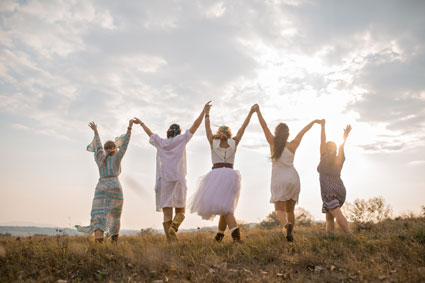Introduction
No matter where you travel or roam, it is important to learn about expected behaviors and manners in social and business environments of the country that you are visiting. Whether you are sitting down to the dinner table with friends or negotiating with the boss of a Russian company, it is important to understand how to behave in all types of situations.
Social Manners
Manners go a long way toward smoothing cultural gaps. When traveling to Russia, be prepared. For example, table manners in Russia are slightly different from those in the United States. Russians are known to be a very generous people, even when dealing with severe economic times. If you happen to be invited to a Russian home during your travels, do not be surprised to find the table laden with food. A Russian may spend a week's worth or more of salary to prepare the dinner, so be diligent in tasting everything and showing your appreciation of their efforts.
In Russia, you will find that smaller plates are used for meals. When eating dessert, you want to use your spoon, not a fork. In Russia, as in many cultures, it is considered rude to reach across the table for anything.
When not using your fork, place the fork on the table with the tines of the fork facing downward. If you are at a restaurant or even in someone's home, you can signal that you are finished eating by placing your knife and fork parallel across the middle of the plate. While in the United States, it is considered polite to eat everything on your plate, in Russia, you do want to leave a little bit of food on the plate, as that is considered good manners there.
As in the United States, it is common to bring a bouquet of flowers to your host. However, when choosing flowers, be aware of what is accepted and what is not in the Russian culture. Such "rules" may seem silly to foreigners, but the Russians take them very seriously. For example, do not give a bouquet to anyone with an even number of flowers in it. Such arrangements are generally reserved for funerals. In Russian culture, white flowers denote innocence, red denotes love, and yellow denotes betrayal or sadness.
Gifts are presented immediately, and do not have to be gift wrapped. Some Russian hosts may wait to open a gift until later after all the guests have left, as being too anxious may seem inappropriate (and embarrass those who did not bring a gift). Do not be offended if a wrapped gift is not opened immediately, or if the gift is not even mentioned or opened at all during your stay. Different scenarios provoke different responses, but rest assured that your gift is appreciated.
When introductions are made in the United States, it is common to shake hands, but such is not necessarily the case in Russia. Introductions are also not as important in Russia as in the U.S. For example, do not be surprised if, when entering a room where you may know one person but not the other, that you are not introduced, and vice versa. It is up to you to either introduce yourself or not.
In Russia, mealtimes vary. Of course, the day starts with breakfast, and the main meal of the day, or "dinner," is served at one o'clock in the afternoon. Dinner is usually served with appetizers, soup, a main entr�e, and a dessert. Supper is typically served around seven o'clock or even later, with appetizers, a main entr�e, and more often than not, dessert. There really is no "lunch" in Russia as we observe it in the United States. At this point, we should also mention that Russians tend to serve beverages at room temperature, and that goes for water, juices, and soft drinks. Ice is rarely used.
In Russia, taking care of your personal hygiene needs is not always as easy as it is in the United States. Public Russian toilet facilities are often crude and dirty. Toilet paper is not generally available when using public "restrooms" so when traveling there, always carry a packet of Kleenex or tissues with you. Pay toilets might provide toilet paper, soap, and other amenities, but not always. Be prepared to ask if there is an attendant, especially in venues where performances are held (that means always check the toilet first!). However, you may find cleaner toilets and facilities in Western style fast food restaurants throughout Russia's larger cities.
Manners are not black-and-white in Russia, and what expectations and behaviors are considered proper or not, differ drastically depending on where you are in Russia. It also will depend on the age of the person you are visiting, or with whom you are dealing, as well as whether you are in a city like Moscow or are in a more rural location. Ethnicity plays a large role in how you should behave. Our next lesson will focus briefly on doing business in different regions and introduce you to Russian ethnicity of major groups found in the country.
Russian Ethnicity. Doing Business in Different Regions
Introduction
Because of its size, Russia naturally has a variety of ethnicities. Since the collapse of the Soviet Union, the creation of new countries (especially the CIS region with countries including Azerbaijan, Uzbekistan, Tajikistan, Armenia, Turkmenistan, and Moldova), have created more separation concerning culture and heritage throughout Russia.
The Commonwealth of Independent States
More commonly known as CIS, the Commonwealth of Independent States is called Sodruzhestvo Nezavismykh Gosudarstv in Russian. These regional areas or countries belonged to the former Soviet Union. While the administrative center of the CIS as a region continues to be Minsk, and the official language still remains Russian, the CIS, established in late 1991, is still a growing, changing, and developing a number of regions and countries along the western borders of Russia itself.
The Russian Federation, Ukraine, and the Republic of Belarus founded the CIS following the dissolution of the Soviet Union. These countries became separate entities of the former U.S.S.R. and today operate as sovereign and independent nations. Countries that belong to the CIS include:
- Armenia.
- Azerbaijan.
- Kazakhstan.
- Kyrgyzstan.
- Moldova.
- Turkmenistan (unofficial member).
- Tajikistan.
- Uzbekistan (unofficial member).
- Georgia (former member, withdrew in 2008).
- Lithuania.
- Estonia.
- Latvia.
In addition to the CIS region, Russia itself, as the former Soviet Union, has experienced near record growth (like other countries in the region) and is experiencing large numbers of immigrants. As of 2010, a variety of Russian ethnicities made up most of the Russian population. Numerous ethnicities are found in the:
- North Caucasus Federal District.
- Ural Federal District.
- Siberian Federal District.
- Far East Federal District.
- Volga Federal District.
- Southern Federal District.
- Northwest Federal District.
- Central Federal District.
Major ethnic groups found throughout Russia belong to various categories.
- Caucasians. (Includes Chechens, Avars, Georgians, Dargins, Laks, and Aguls)
- Indo-European. (Includes Russians, Ukrainians, Armenians, Belarusians, Bulgarians, Latvians, Greeks, and Moldovans)
- Turkic. (Includes Tatars, Azerbaijani, Balkars, and Kazakhs)
- Mongols. (Includes the Semitic tribes, Vietnamese, Koreans, and Manchu-Tungus)
- Uralic. (Includes Estonians, Samoyedic peoples, and those of Finno-Ugric dissent)
- Chukotko-Kamchatkan. (Includes Eskimo-Aleut, Chukchi, and Nivkh)
Actually, Russia is home to over 160 different ethnic groups as well as large numbers of indigenous people. In the 2010 census, 81% of the Russian population defined their ethnicity as Russian. In decreasing numbers, the other main ethnic groups include:
- Tatars.
- Ukrainians.
- Bashkir.
- Chuvash.
- Chechens.
- Armenians.
Every region and culture in Russia has their own heritage as well as their way of doing business. Whenever possible, research the area to determine differences and similarities in culture and traditions. Regardless of where you travel in Russia, be prepared to listen more than talk, especially in terms of business. Remember also that most Russians (regardless of region) regard compromise and 'teamwork' as a weakness, rather than beneficial, from a business environment standpoint.
When traveling for business in any part of Russia, be prepared to stick to your game plan; know what you want, and resist change. We briefly offered some tips regarding doing business in Russia in Lesson 2, and while it is impossible (in the scope of this course) to define all the do's and do not's of doing business in the CIS, or the difference between engaging in business in Moscow or in a smaller town. It is important to watch, listen, and learn.
It takes time to develop business relationships, and many Russians, regardless of location, are not as concerned about what is printed on a piece of paper but as the type of person you are and how you present your business proposal, meeting, or negotiations.
As a businessperson traveling to Russia for business meetings, negotiations, partnerships, or developments, learn as much as you can about Russian business methods, manners, and traditions. We have just touched the tip of the iceberg to get you started. However, continue your research. Doing so will not only stand you in good stead with the Russians, but may help give your business venture a boost.
Russian Traditions, Religion, and Superstitions
Introduction
Russians enjoy a variety of holidays, including New Year's Day. In the past, Russians were not allowed to celebrate Christmas, although today, things have changed. In Russia, Christmas is celebrated on January seventh, while New Year's, as in the United States, is celebrated on January first. New Year's Day is one of the most cheerful and exuberant Russian holidays.
On January thirteenth, Russians celebrate old New Year Day. Prior to 1918, Russians followed a different calendar. Today, Russia remembers and celebrates its past as well as its present by often celebrating both the "old" and the "new" style when it comes to holidays celebrated. In the past, Russia adapted to the Old Russian or Julian calendar, and today they have adopted the European or Gregorian calendar.
Russians also celebrate a holiday called "Homeland Defenders Day," which is more or less known as Men's Day. February 23 is the day that Russian men are eligible for military callout services and so women and family members traditionally honor the day by gifting the men in their lives with small gifts and thoughtful gestures.
Women's Day is celebrated on March eighth. Interestingly, on this day, men are expected to do all the housework, giving the woman a break. It is an interesting holiday, similar to Valentine's Day, as gifts, flowers, and candy is usually offered to women in a gesture of appreciation for their hard work.
As in the United States, April first, known in Russia as the Day of Laughs, is similar to April Fools' Day in the United States. As in the United States, it is a day for jokes, funny stories on television and in newspapers, and generalized silliness.
The second holiday in May is Victory Day, a two-day public holiday celebrated over May eighth and ninth. Victory Day commemorates the surrender of Nazi Germany in 1945. Russians are still quite sensitive about their war with Germany, as they lost over 20 million citizens during their four-year-long war with Germany. On this day, a minute of silence is announced at 9:00 PM on television stations throughout the country, in memory of those who perished. Following the moment of silence, fireworks can be seen throughout the country.
June offers one "official" holiday, known as Independence Day. The holiday is new, and most people just take the day to enjoy the outdoors. Summertime is relatively quiet in Russia, and the next holiday on the official holiday calendar marks the beginning of another school year. It is called Day of Knowledge, celebrated on the first of September. Children take flowers to their teachers and parents and children traditionally attend meetings before classes start.
On the seventh of November, the "Day of October Revolution" is honored. The date reflects the old or Julian calendar, and although it is still recognized, it is not as big of a holiday as it used to be during the years of the Soviet Union.
Constitution Day is celebrated on the twelfth of December, commemorating the first constitution of the Russian Federation, adopted in 1993. Because the holiday is still new, people choose to celebrate the day in their own way.
In addition to the above listed traditional Russian holidays, business travelers and vacationers should know that Russia has also adopted many Western holiday traditions including Christmas, Halloween, and St. Valentine's Day. Today's Russia is extremely tolerant of other religions, and they celebrate a variety of Jewish, Chinese, and Muslim holidays.
Unlike the United States, holidays and weekends are shifted around to maintain an adequate workweek. For example, if a holiday happens to land on a Thursday, Sunday becomes a working day and Friday becomes a day off. If the holiday lands on a Tuesday, Saturday becomes the working day, and Monday becomes a day off. Unfortunately, if a holiday happens to land on a Wednesday, there is no long weekend at all.
Russian Superstitions
Like many cultures, Russia has its superstitions. The seriousness with which individuals take superstitions depends on individual beliefs, age, and preferences, the same as in the United States. Russia is a country that is over a thousand years old, steeped in tradition, myths, and superstition, some of which are still believed in today.
For example, Russians still believe in the concept of the "evil eye"; many still believe that an angry or evil look can harbor bad luck. Do not be surprised to find someone touching a wooden surface or spitting over their left shoulder several times, even following a compliment. In the case of some compliments, Russians fear that is "tempting fate."
Many people in Russia still believe that it is a bad omen or can bring bad luck to carry an empty bucket, can, or cart around. Therefore, even street cleaners will often carry their utensils or tools in empty carts or buckets, as long as something is in the bucket or can, then they will be okay.
Business travelers should be aware that many people do not feel comfortable with you handing them money. They may gesture for you to put money down on the counter or on a dashboard or on a desk rather than taking the money directly from your hand. This has nothing to do with hygiene or germs, but the fact that for generations, Russians believed that money could transmit negative energy. By placing the money on a surface other than directly on their hand, that negative energy is 'broken' and it is safe to handle the money.
Business travelers as well as vacationers should also be aware that in some regions, it is considered bad luck to place your keys or loose change or an empty bottle on a tabletop. Doing so can bring sadness as well as monetary loss. This goes for both personal kitchens and public restaurants so do not be surprised if your host places an empty bottle under the table or signals the waiter to remove it immediately.
Slavic cultures once believed that the threshold of a home (or any doorway for that matter) harbored evil, and was the dwelling place of demons. Therefore, be aware that you may immediately be invited into an apartment before you even have a chance to introduce yourself! A person at your door must place at least one foot over the threshold, even if they continue to stand in the hallway. If the visitor does not make the first move, the home or apartment owner will often step out into the hallway to talk to you. Reduce your chances of making a bad impression and never stand on the threshold of someone's apartment or home, or talk across it.
Avoid putting your feet on a table or even sitting on a table in Russia. While this is not about hygiene or manners, doing so is seen as an omen of financial loss, poverty, and even death.
These are just a few commonly held superstitions still believed in many parts of Russia today. There are numerous others, and it might behoove business as well as pleasure travelers to check on local superstitions of the region to which you are traveling, just in case.
Freedom of religion is a recent concept in today's Russia, and under Marxist and Soviet rule, Russians were 'discouraged' from practicing religion. Instead, they were encouraged to practice tenants promoted by Marxism and Leninism. Before the 1917 Bolshevik Revolution, the Russian Orthodox Church was the predominant religion throughout Russia. The Bolshevik Revolution (we will talk briefly about this in a later lesson) put a lid on the practice of religion, and those who did dare practice their faith increased their risk of punishment, discrimination, and even their jobs.
After 1990, the Russian Orthodox Church enjoyed a renewal throughout Russia. Today, Easter and Christmas church services are once again encouraged, televised, and practiced. Today, Russians can find Bibles and other religious doctrines in local bookstores. Formerly destroyed churches and cathedrals have been rebuilt or restored, and religious buildings, including Lutheran churches, Russian Orthodox, and Catholic churches, as well as Muslim mosques, are under renovation.
Today's Russia offers a variety of faiths, and, in order of their population following, includes Russian Orthodox, Catholics, Muslim, Protestants, and Jews. Today, it is estimated that approximately 75 million Russians belong to the Russian Orthodox persuasion, while 37 million belong to the Muslim faith. Over one million are of Roman Catholic persuasion, another million belong to the Buddhist faith, while nearly one million practice the Jewish faith. The majority of Muslims in Russia are Sunni, but increasing diversity and tolerance has opened the doors to other religions throughout the country.














